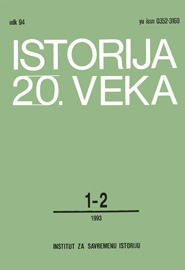LANGUAGE AND RELIGION AS THE INTEGRATING AND DISINTEGRATING FACTORS IN MODERN YUGOSLAV HISTORY
LANGUAGE AND RELIGION AS THE INTEGRATING AND DISINTEGRATING FACTORS IN MODERN YUGOSLAV HISTORY
Author(s): Milorad EkmečićSubject(s): Christian Theology and Religion, Language studies, Recent History (1900 till today), WW II and following years (1940 - 1949), Post-War period (1950 - 1989), Transformation Period (1990 - 2010), Politics and Identity
Published by: Institut za savremenu istoriju, Beograd
Keywords: language; religion; modern Yugoslav society; Christianity; Muslims;
Summary/Abstract: The author attempted to analyze the role of role secular and religious ideologies in the modern Yugoslav history. The idea of Yugoslav togetherness emerged at the end of XVIII century and was basically shaped by the impact of rationalist philosophy from Western Europe. An ideological background should be followed in all political movements on the Balkans. German and French cultures were the historical sources from which ideologies were borrowed. France played a preponderant role in shaping the profile of united Yugoslavia 1918. It was created upon the right of nations to self determination and separation. Following philosophical teaching that nation means language, Yugoslavia 1918 was internationally considered to be a Unitarian nation. The principle of self-determination was implanted to the whole state as one ethnical community. Yugoslavia historically failed not because the national question was not settled there, but because a modern European society was not created there. Due to the inferior culture the rationalistic philosophy that a nation is a community of linguistic oneness has historically failed. Only intellectual strata of the society had access to education, whereas grass roots population used to identify itself along the religious dependence only, the principle of self-determination in 1992 was reserved for the religious communities which constituted the newly created states. Foreign cultural influence upon Yugoslavia has always been preponderant. In this paper the author followed historical rise of Christian clericalism. With Serbs it was ruling between years 1860 till 1878. It was conceived in the Message to the Serbs by the Russian Slavophiles in 1860. Serbian intelligentsia, although temporarily, accepted teaching that by the mythical Slavic discipline, Serbs had to reject western parliamentarian democracy. Consequently, the idea of a Yugoslav political unity with the Catholic Croatia and Slovenia were condemned as the unslavic road to the future. It was the cause of collapse in 1878. Catholic clericalism, and, consequently, all its ramifications into different currents, has played a decisive role in the shaping of Yugoslav politics till modern times. Usually, lessons of Catholic clericalism and all its practical achievements came from Germany. Teachers to the Yugoslavs in philosophy and industries, Germans were their teachers in religious intolerance, too. The rise of clericalism paved the road from Febronionism from the end of XVIII century, Liberal Catholicism after 1830 to conservative ideology after 1870. Catholic Action was a network of densely interwoven institutions by which a catholic community organizes a state inside a secular state. Papal encyclicae Nobilissima Galorum Gens 1884 on civil society, in a strictly Catholic mode, and Rerum novarum 1891 on the corporative society between atheism and free capitalism, were principal sources of this ideology. The author followed the development of Yugoslav Moslems from the internationally recognized religious minorities, 1878 (Berlin Congress), till the emergence of modern fundamentalism. Religions and the established churches played a decisive role in the modern Yugoslav history. After the collapse of Yugoslavia in 1941, the independent Croatian state was a type of Catholic dictatorship Massacre and forcible conversion of Serbs and Jews was its principal result. The number of victims varies, but approximate figures range between 400.00 and 750.000. The genocide of 1941 became a trauma of modern development. Fear of biological extermination and struggle for survival is the most motive force. The ideology of German clericalist Christliche Rechstaat helped to establish not genuine democracy, but a variant which played a role in bringing about a civil war in Yugoslavia 1991-1992.
Journal: Istorija 20. veka
- Issue Year: 1993
- Issue No: 1+2
- Page Range: 7-19
- Page Count: 13
- Language: English

